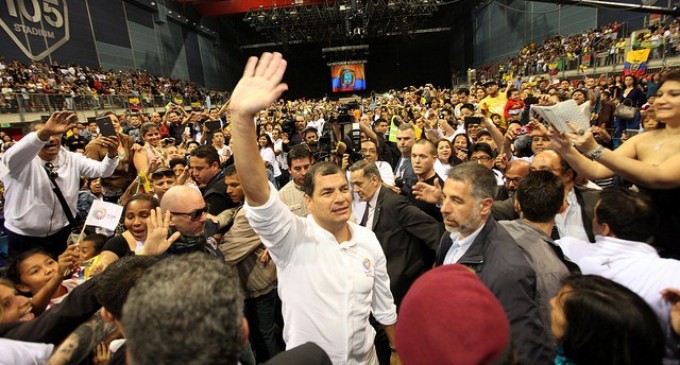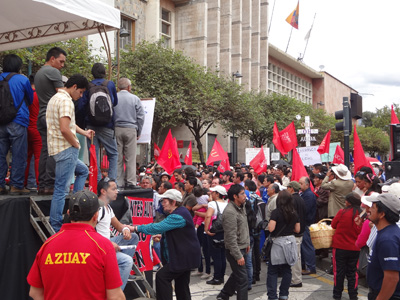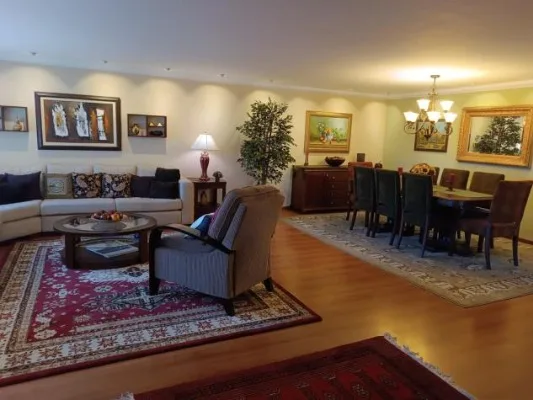The report card on Correa after eight years: Some remarkable accomplishments but storm clouds gather on the horizon
Rafael Correa is a megalomaniac, a loud-mouth, a control freak, a religious fanatic, the architect of a nanny state, a muzzler of free speech, and a court-packer. He is, by turns, intolerant, insulting, insensitive, paranoid, condescending and thin-skinned.
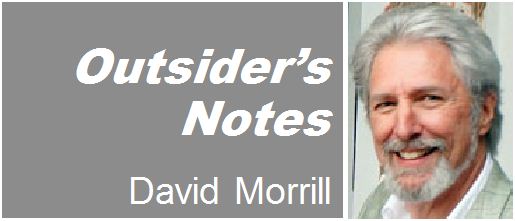 He is also the best president Ecuador has had in decades, possibly since Eloy Alfaro at the beginning of the 20th century.
He is also the best president Ecuador has had in decades, possibly since Eloy Alfaro at the beginning of the 20th century.
By defeating the Ecuadorian oligarchy that had functioned as manager and handler to the country’s presidents for most of the last two centuries, Correa, with his Alianza Pais party in control of the National Assembly, has effectively ended Ecuador’s long rein of status quo governance.
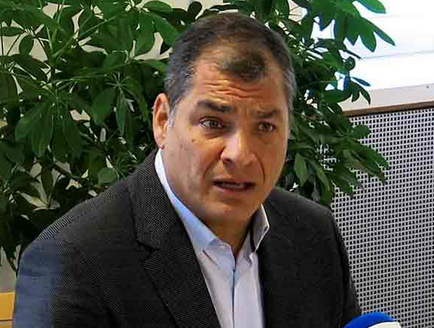
Former president Rafael Correa
Over the last eight years, Correa has overseen the largest infrastructure building project in the country’s history. Highways, airports and bridges have been built or rebuilt, and work on a series of hydro-electric generation projects that will make Ecuador electricity independent, are well underway. In Quito and Cuenca, light rail mass transit systems are under in construction. Public hospitals and medical clinics, schools and universities, are being built and upgraded, at an unprecedented pace.
His social programs have made Ecuador the leader in reducing poverty in Latin America, and strengthened law enforcement has put Ecuador among the top five countries for lowest crime rates in Latin America in several categories, including murder.
In all, Correa has committed almost 45% of Ecuador’s GDP to public projects, both infrastructure and social programs, the largest percentage of any country in the western hemisphere.
Correa’s critics correctly point out that he has been the beneficiary of extremely favorable economic conditions, most notably high oil prices, which have generated as much of 25% of the national income since 2007. He has also had more money to invest by defaulting, in 2008, on bonds issued by previous governments, calling them “illegitimate.” Critics also note the fact that poverty and crime rates began their decline before he assumed office.
It is hard to argue, however, that the results of the last eight years have not been achieved without a sophisticated, well thought-out vision of the country’s future. There is little doubt that Rafael Correa has a genuine interest in putting Ecuador among the first rank of Latin American countries.
Just as important as his vision, is the fact that he has been reelected twice and has been in office for eight years. The previous eight presidents, both elected and interim, served an average of 16 months, three of them being run out of Quito with a mob in hot pursuit. With such rapid fire turn-over of power, political survival trumped any thought of advancing the interests of the country.
An era of stability
Correa’s staying power and support from a majority of the poor and middle class, has led to an era of stability the country has not seen for decades. The number of street demonstrations by the indigenous, campesinos, students and various labor unions that disrupted transportation and business –and ousted presidents– have declined dramatically since he took office.
Before Correa, long-time Cuenca expats well remember having to call a hotline before taking car and bus trips to Loja or the coast to find out if roads were blockaded by protests. Sometimes, in fact, roads were closed for days at a time and the only way out of Cuenca was by air. On protest days in Parque Calderon and on Av. Doce de Abril, passersby also remember checking the wind direction to avoid the tear gas.
Among other things, the prosperity and tranquility of the Correa era has attracted thousands of North American and European expatriates.
Trouble on the horizon
Trouble is brewing, however.
The plunge in oil prices has left a gaping hole in the national budget, and despite the government’s effort to manage the shortfall with budget cuts and Chinese loans, a large funding gap remains.
Several government programs and decisions are proving unpopular with large segments of the population, handing political opponents potent issues for the 2017 election.
Recent legislation eliminating a 40% government contribution to the Social Security program is mobilizing groups of workers and retirees for legal challenges and street protests. Although the government insists that pensions are guaranteed, it has made a number of changes that will reduce future payouts. The move to make Social Security self-sufficient is also forcing drastic budget reductions for the program health care system.
The elimination of the LP gas subsidy, scheduled for late 2016 or early 2017, in the midst of the next national election cycle, could also prove to be political dynamite. Correa’s plan to shift the country from gas to electric cooking, which involves an offer of low interest loans for the purchase of new cook tops and re-wiring, is running far behind schedule. Don’t be surprised if he kicks the canister down the road and delays the subsidy elimination until after the election.
Another trouble spot is the vast array of increased government regulation, much of it aimed at businesses and employment rules.
And then, there are the dubious personality traits and management style issues mentioned at the top, that have alienated constituencies on both from the left and the right. Correa’s strong aversion to even the most mild criticism, even from insignificant sources, often seems bizarre. Criticism of his government is typically met with tirades and prescriptions of hell fire, frequently delivered through social media.
Often, his anger descends to the level of theater of the absurd, such as his confrontation two weeks ago with a schoolboy who shot a bird at the presidential motorcade in Quito.
Another memorable theater episode came in February when Correa felt compelled to respond to comedian John Oliver’s tv show comment about the entrance of a clown during one of Correa’s Saturday morning television broadcasts (Oliver simply said that every president should have a clown). Through his Twitter account, Correa reacted, and when Oliver reacted to the reaction, Correa fired back again. Oliver finally asked Correa, “Don’t you have a country to run?”
The low point of the confrontation came when Tiko Tiko the clown weighed in in defense of the president. Surely, there is nothing more pathetic than a pissed-off clown.
The coming election
It remains uncertain whether Correa will seek another term, assuming that the constitution is amended to allow it, which appears likely. Some insiders say it is his preference that a strong Alianza Pais candidate will emerge to succeed him. On the other hand, given his out-sized ego, it is hard to imagine him not running if none does.
Although his poll numbers have dropped significantly in recent months, Correa remains the most popular Ecuadorian president in generations, and for good reason. With a deeply divided political opposition, it is difficult at this point to imagine him losing if he decides to run again. Warts and all.
_________________
Ecuador’ Secretaría Nacional de Comunicación responds to the article
On June 22, 2015, CuencaHighLife received an email from the SECRETARÍA NACIONAL DE COMUNICACIÓN (Office of National Communication). They requested that we publish their response to this article as a PDF document instead of in the comments section. To read it, click here.




